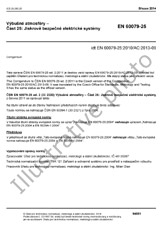We need your consent to use the individual data so that you can see information about your interests, among other things. Click "OK" to give your consent.

IEEE 430-2017
IEEE Standard Procedures for the Measurement of Radio Noise from Overhead Power Lines and Substations
Translate name
STANDARD published on 17.3.2017
The information about the standard:
Designation standards: IEEE 430-2017
Publication date standards: 17.3.2017
SKU: NS-678591
The number of pages: 34
Approximate weight : 102 g (0.22 lbs)
Country: International technical standard
Category: Technical standards IEEE
Annotation of standard text IEEE 430-2017 :
New IEEE Standard - Active.
Uniform procedures for the measurement of radio noise generated by corona from overhead power lines and substations are established in this standard. Measurement procedures in this standard are also valid for other power-line noise sources such as gaps and harmonics; however, most of the precautionary information, analysis, and data plotting techniques were written and developed primarily for corona discharges. The procedures are not valid for measuring transient radio noise sources that occur during breaker or disconnect switching operations. The procedures apply in the frequency range of 0.010 MHz to 1000 MHz; however, the emphasis is on the standard amplitude-modulation broadcasting (0.535 MHz to 1.605 MHz) and television broadcasting (54 MHz to 72 MHz, 76 MHz to 88 MHz, 174 MHz to 216 MHz, and 470 MHz to 698 MHz) bands. This standard is applicable to both ac and dc transmission lines and substations.
ISBN: 978-1-5044-3695-3, 978-1-5044-3696-0
Number of Pages: 34
Product Code: STD22394, STDPD22394
Keywords: corona, IEEE 430, measurements, radio noise, substations, transmission lines
Category: Power Transmission and Distribution


 Cookies
Cookies
